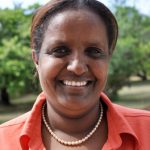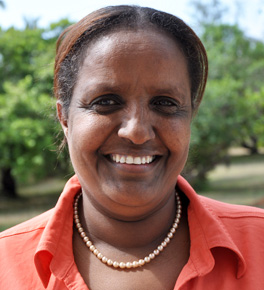OUR FELLOWS

OUR FELLOWS
Fetien Abay Abera is focused on breeding barley, an important highland crop that is used in making injera, the fermented flat-bread that most of Ethiopia’s 80 million people consume daily, as well as porridge and kollo (roasted grains). Her aim is to produce varieties with improved drought and waterlogging tolerance, including increased amylose, betaglucan, iron, and zinc content.
“I use different tools, including molecular mapping of quantitative trait loci (QTLs) combined with improved field experimental designs and analyses, participatory methods, and conventional breeding,” explains Abera.
I use different tools, including molecular mapping of quantitative trait loci (QTLs) combined with improved field experimental designs and analyses, participatory methods, and conventional breeding,” explains Abera. “We are investigating a promising cross between the early-maturing, drought-tolerant Saesa and the later, high-quality Himblil variety, which is tolerant against waterlogging
Field of Research
Technology development of barley production and farmers’ empowerment in Tigray, northern Ethiopia.
Fellows Stories
University Professor Taps Into Gendered Participatory Plant Breeding for Increased Farmer Adoption
Date: November 24, 2017

Earlier this October, Dr. Fetien Abay Abera, a 2010 African Women in Agricultural Research and Development (AWARD) Fellow and professor of Plant Breeding and Seed at?Mekelle University, Ethiopia, was named as a the second runner-up for the Impact Research and Science in Africa (IMPRESSA) Award of the Regional Universities Forum for Capacity Building in Agriculture (RUFORUM). The award, which was announced at RUFORUM’s 13th?Annual General Meeting in Lilongwe, Malawi, was established in 2009 and recognizes "outstanding university-led contributions to development through agricultural research and science, human and institutional capacity building." To those familiar with Dr. Abera’s work, that she is a recipient of the IMPRESSA Award comes as no surprise.? Dr. Abera is a woman of many firsts; she was the first female lecturer at Mekelle University, and the first Professor in Plant Breeding and Seed in the Department of Dryland Crop and Horticultural Sciences in Ethiopia. In addition to maintaining her work as a tenured professor at Mekelle University, Dr. Abera is the director of Institute of Environment, Gender, and Development Studies (IEGDS), and an associate editor for the Journal of Dryland Agriculture, and much more.
